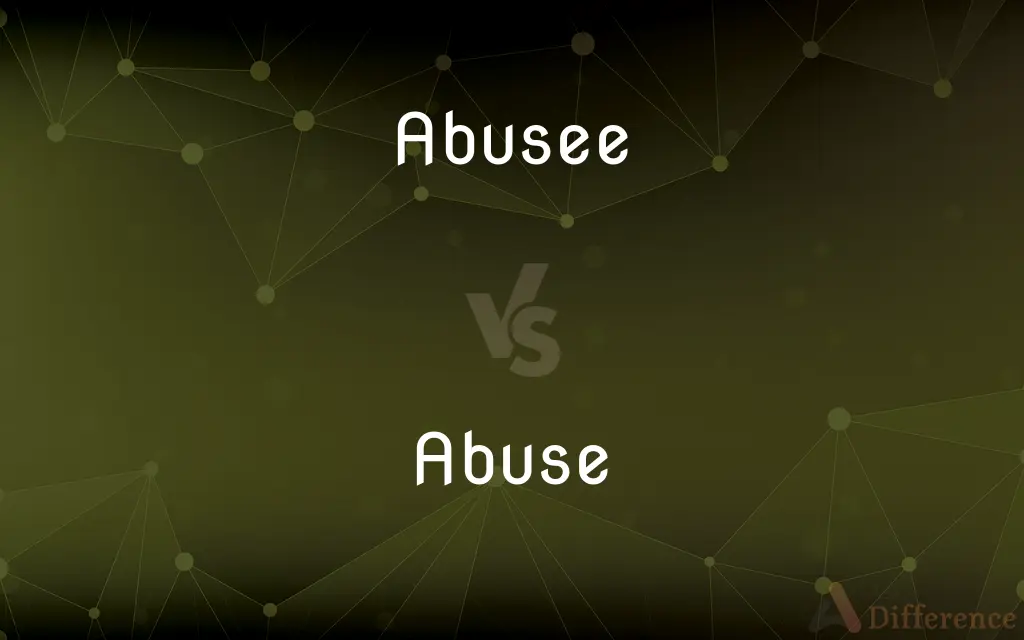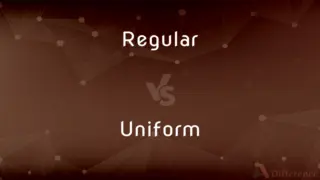Abusee vs. Abuse — What's the Difference?
By Tayyaba Rehman — Updated on September 24, 2023
"Abusee" refers to the person who is subjected to abuse, while "Abuse" denotes the improper treatment or usage, often with harmful intentions.

Difference Between Abusee and Abuse
Table of Contents
ADVERTISEMENT
Key Differences
Abusee" is a term that specifically identifies the individual or entity on the receiving end of abuse. It is a person who is mistreated or harmed. In contrast, "Abuse" refers to the act or behavior itself, describing the manner in which someone or something is treated in a harmful, injurious, or offensive way.
While "Abusee" centers on the victim of such behaviors, "Abuse" encompasses a wide range of harmful actions, whether verbal, physical, emotional, or other. The former is inherently passive, signifying someone subjected to negative actions, while the latter is active, indicating the action or behavior itself.
In conversations addressing harmful behaviors, the distinction between "Abusee" and "Abuse" is crucial. Understanding the difference aids in ensuring that discussions are sensitive to the victims, emphasizing the "Abusee's" experiences, while also addressing the nature and impact of the "Abuse."
To further illustrate, think of a situation where someone is subjected to derogatory language. The individual facing these hurtful words is the "Abusee," whereas the hurtful language itself represents the "Abuse."
Comparison Chart
Meaning
Person who is subjected to abuse.
Improper treatment or harmful usage.
ADVERTISEMENT
Usage in Grammar
Used as a noun.
Noun, but can also be a verb.
Role
Passive (the recipient of an action).
Active (the action or behavior itself).
Emphasis
On the victim.
On the harmful action or behavior.
Common Contexts
Personal relationships, crime reports.
Actions, treatments, usages.
Compare with Definitions
Abusee
Recipient of harmful or injurious treatment.
The abusee may experience long-term emotional trauma.
Abuse
Offensive or derogatory language.
Verbal abuse can leave deep emotional scars.
Abusee
Victim of negative actions or behaviors.
The organization supports abusees in their healing journey.
Abuse
Improper or excessive use.
The abuse of drugs can lead to severe health issues.
Abusee
Person on the receiving end of mistreatment.
It's crucial to listen to the abusee's account without judgment.
Abuse
Abuse is the improper usage or treatment of a thing, often to unfairly or improperly gain benefit. Abuse can come in many forms, such as: physical or verbal maltreatment, injury, assault, violation, rape, unjust practices, crimes, or other types of aggression.
Abusee
One who endures harmful behaviors.
Many abusees fear retaliation if they report the incidents.
Abuse
To use improperly or excessively; misuse
Abuse alcohol.
Abuse a privilege.
Abusee
Individual subjected to maltreatment.
The abusee often finds it difficult to speak out.
Abuse
To hurt or injure by maltreatment; ill-use
Animals that were abused by a negligent owner.
Abusee
A person who is the victim of abuse (by an abuser).
Abuse
To force sexual activity on; rape or molest.
Abuse
To assail with insulting or hurtful words; revile.
Abuse
(Obsolete) To deceive or trick.
Abuse
Improper or excessive use; misuse
Abuse of authority.
Drug abuse.
Abuse
Rough treatment or use
Shoes that have taken a lot of abuse.
Abuse
Physical maltreatment or violence
Spousal abuse.
Abuse
Sexual abuse.
Abuse
Insulting or hurtful language, especially when used to threaten or demoralize
Subjected her subordinates to verbal abuse.
Abuse
An unjust or wrongful practice
A government that commits abuses against its citizens.
Abuse
Improper treatment or usage; application to a wrong or bad purpose; an unjust, corrupt or wrongful practice or custom.
All abuse, whether physical, verbal, psychological or sexual, is bad.
Human rights abuses.
Abuse
Misuse; improper use; perversion.
Abuse
(obsolete) A delusion; an imposture; misrepresentation; deception.
Abuse
Coarse, insulting speech; abusive language; language that unjustly or angrily vilifies.
Abuse
Catachresis.
Abuse
Physical maltreatment; injury; cruel treatment.
Abuse
Violation; defilement; rape; forcing of undesired sexual activity by one person on another, often on a repeated basis.
Abuse
(transitive) To put to a wrong use; to misapply; to use improperly; to misuse; to use for a wrong purpose or end; to pervert
He abused his authority.
Abuse
(transitive) To injure; to maltreat; to hurt; to treat with cruelty, especially repeatedly.
Abuse
(transitive) To attack with coarse language; to insult; to revile; malign; to speak in an offensive manner to or about someone; to disparage.
Abuse
(transitive) To imbibe a drug for a purpose other than it was intended; to intentionally take more of a drug than was prescribed for recreational reasons; to take illegal drugs habitually.
Abuse
To violate; defile; to rape; (reflexive) to masturbate.
Abuse
Misrepresent; adulterate.
Abuse
To deceive; to trick; to impose on; misuse the confidence of.
Abuse
Disuse.
Abuse
To put to a wrong use; to misapply; to misuse; to put to a bad use; to use for a wrong purpose or end; to pervert; as, to abuse inherited gold; to make an excessive use of; as, to abuse one's authority.
This principle (if one may so abuse the word) shoots rapidly into popularity.
Abuse
To use ill; to maltreat; to act injuriously to; to punish or to tax excessively; to hurt; as, to abuse prisoners, to abuse one's powers, one's patience.
Abuse
To revile; to reproach coarsely; to disparage.
The . . . tellers of news abused the general.
Abuse
To dishonor.
Abuse
To violate; to ravish.
Abuse
To deceive; to impose on.
Their eyes red and staring, cozened with a moist cloud, and abused by a double object.
Abuse
Improper treatment or use; application to a wrong or bad purpose; misuse; as, an abuse of our natural powers; an abuse of civil rights, or of privileges or advantages; an abuse of language.
Liberty may be endangered by the abuses of liberty, as well as by the abuses of power.
Abuse
Physical ill treatment; injury.
Abuse
A corrupt practice or custom; offense; crime; fault; as, the abuses in the civil service.
Abuse after disappeared without a struggle..
Abuse
Vituperative words; coarse, insulting speech; abusive language; virulent condemnation; reviling.
The two parties, after exchanging a good deal of abuse, came to blows.
Abuse
Violation; rape; as, abuse of a female child.
Or is it some abuse, and no such thing?
Abuse
Cruel or inhumane treatment
Abuse
A rude expression intended to offend or hurt;
When a student made a stupid mistake he spared them no abuse
They yelled insults at the visiting team
Abuse
Improper or excessive use
Abuse
Treat badly;
This boss abuses his workers
She is always stepping on others to get ahead
Abuse
Change the inherent purpose or function of something;
Don't abuse the system
The director of the factory misused the funds intended for the health care of his workers
Abuse
Use foul or abusive language towards;
The actress abused the policeman who gave her a parking ticket
The angry mother shouted at the teacher
Abuse
Misuse or mistreatment.
The abuse of power is a serious concern in many institutions.
Abuse
Harmful or injurious treatment.
Child abuse is a grave crime that demands strict penalties.
Abuse
Unjust or corrupt practice.
Financial abuse often goes unnoticed in many systems.
Common Curiosities
Can organizations be an "Abusee"?
In broader contexts, entities can be "abused," but "Abusee" usually refers to individuals.
Can "Abuse" also be a verb?
Yes, one can "abuse" power, drugs, etc.
Is emotional mistreatment also "Abuse"?
Yes, emotional or psychological abuse is a form of mistreatment.
Is "Abusee" always a person?
Typically, yes. "Abusee" refers to the individual subjected to abuse.
How can one support an "Abusee"?
By offering a safe space, empathy, and ensuring they get professional help if needed.
Is "Abusee" a commonly used term?
While it conveys the intended meaning, terms like "victim" or "survivor" are more common.
Does "Abuse" only refer to physical harm?
No, "Abuse" can be physical, emotional, verbal, or any form of mistreatment.
Is "Abuse" always intentional?
Not necessarily. Some might abuse unintentionally due to ignorance or lack of awareness.
Share Your Discovery

Previous Comparison
Regular vs. Uniform
Next Comparison
Gent vs. GentlemanAuthor Spotlight
Written by
Tayyaba RehmanTayyaba Rehman is a distinguished writer, currently serving as a primary contributor to askdifference.com. As a researcher in semantics and etymology, Tayyaba's passion for the complexity of languages and their distinctions has found a perfect home on the platform. Tayyaba delves into the intricacies of language, distinguishing between commonly confused words and phrases, thereby providing clarity for readers worldwide.














































